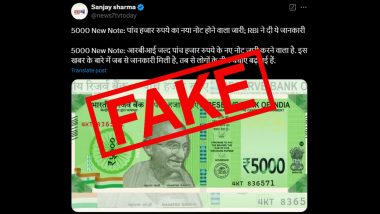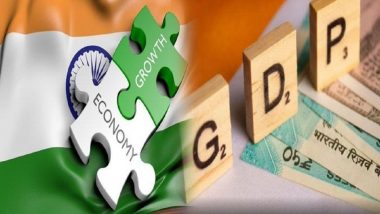Mumbai, March 27: The Reserve Bank of India today announced a slew of emergency measures to boost the economy amid the coronavirus pandemic. Among a host of liquidity infusion measures, Governor Shaktikanta Das reduced the repo rate by 75 basis point to 4.4 percent and reverse repo by 90 basis point to 4 percent. In addition to this, Das also announced that banks, lending institutions may allow a three-month moratorium on all loans classified as term loans.
The announcements today came as a huge relief to people being burdened by slowing economy amid the coronavirus outbreak and the 21-days lockdown called to tackle the menace. LatestLY explains what does 3-month moratorium on repayment of loans means. Bank Loan EMIs: RBI Recommends 3-Month Moratorium And Interest Deferment on All Loans Amid COVID-19 Crisis.
A moratorium period refers to a particular period of a loan tenure during which the borrower will not have repay anything. This can be described as a waiting period before the borrower will have to start paying the EMIs for his or her loan.
Bank Loans EMIs: Three-Month Moratorium
The RBI in its statement said, "All commercial banks (including regional rural banks, small finance banks and local area banks), co-operative banks, all -India Financial Institutions, and NBFCs (including housing finance companies and micro-finance institutions) ("lending institutions") are being permitted to allow a moratorium of three months on payment of instalments in respect of all term loans outstanding as on March 1, 2020."
In the next three months, borrowers will have the options to not pay the EMI instalments. However, all banks will have to get clarity and approval from their respective boards on the implementation of the moratorium policy. As of now, RBI has allowed all lending institutions to offer a 3-month moratorium, but borrowers will get more clarity from their respective banks and lending institutions once they decide on how to go ahead. Basically, the final decision on allowing the three-month moratorium to loan takers will be taken by the respective banks.
The moratorium does cover both interest and the principal. One will get exempted from paying the entire EMI, including payment and interest for three months. This will be applicable on all loans outstanding as on March 1, 2020.
Automated EMI Payments
In case your bank approves the three-month moratorium on your loan, and your EMIs are automatically deducted from your bank account, you would need to make those payments inactive for three months.
Credit Ratings And Waiver or Deferment
The RBI informed that the deferment of loan repayment for three months starting March 1, 2020, will not impact the credit history of the borrower. It will further not lead to a downgrading of the borrower's credit rating or affect the risk classification of the loan.
Meanwhile, the RBI has not offered a waiver, but it is a deferment on the payment of installments on all term loans. RBI said, "The repayment schedule and all subsequent due dates, as also the tenor for such loans, maybe shifted across the board by three months. "
Credit Card Payments to be Impacted by RBI Announcement?
RBI announcement came as a sigh of relief to a huge chunk of self-employed people as well as the smaller businesses, whose incomes may have come to a standstill amid a three-week lockdown imposed on the country to fight the impact of coronavirus.
(The above story first appeared on LatestLY on Mar 27, 2020 04:14 PM IST. For more news and updates on politics, world, sports, entertainment and lifestyle, log on to our website latestly.com).













 Quickly
Quickly





















